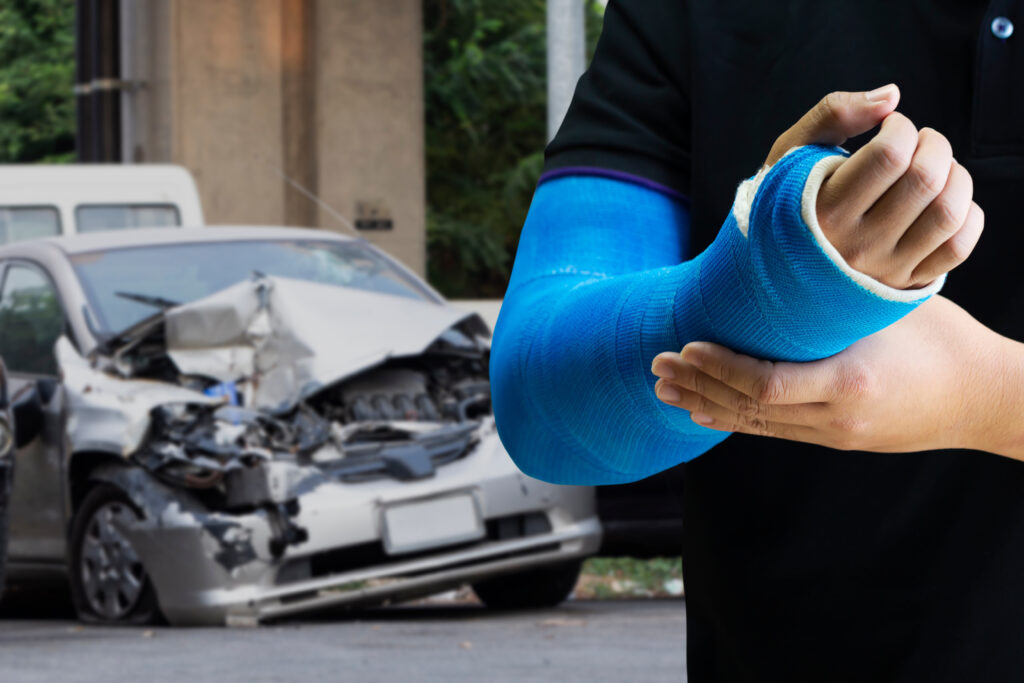Understanding Auto Accident Injuries:
Recovery and Treatment
Finding Pain Relief After An Auto Accident Injury
Auto accidents aren’t just moments of impact—rather, they echo through our lives, affecting us both physically and emotionally long after the crash itself. Even seemingly minor collisions have the potential to cause concealed injuries that may not immediately exhibit symptoms but could gradually emerge in the days following. The surge of adrenaline and the shock experienced right after the accident might veil symptoms, leading to delayed awareness of potential injuries. Therefore, placing an emphasis on health and safety is paramount, necessitating an immediate medical evaluation following any accident. While certain injuries, like visible fractures, might be immediately apparent, others such as soft tissue damage or whiplash might not reveal themselves until later. Timely medical attention serves as an early checkpoint, ensuring the prompt identification and effective treatment of any underlying injuries sustained, offering the best chance for swift recovery and healing.

Ready To Get Started?
Request your new patient consultation today to find out what Advanced Pain Solutions can do to help you find lasting relief.

What Should I Do After An Auto Accident?
The aftermath of an auto accident demands immediate action. Even if you feel uninjured or symptom-free, it’s essential to seek medical attention without delay. Medical professionals can perform comprehensive evaluations to identify any injuries that may not be immediately apparent. Early intervention can prevent future complications or chronic pain, offering a better prognosis for recovery. It’s not uncommon for injuries like whiplash, concussions, or soft tissue damage to manifest hours or days post-accident. Documentation and reporting of injuries are pivotal for legal and insurance purposes, so seeking medical evaluation ensures a comprehensive record of injuries sustained during the accident.
Here’s a checklist of what you should do after an auto accident:
- Seek Immediate Medical Attention: Regardless of feeling uninjured or symptom-free, prompt medical assessment is crucial.
- Comprehensive Evaluation: Medical professionals can identify hidden injuries that might not immediately appear, ensuring early intervention.
- Prevent Future Complications: Early detection and treatment prevent potential chronic pain or complications from developing.
- Delayed Manifestation of Injuries: Whiplash, concussions, or soft tissue damage can appear days after the accident. Regular check-ups are vital.
- Documentation and Reporting: Obtaining a medical evaluation helps in creating a comprehensive record of injuries for legal and insurance purposes.
This checklist underscores the immediate need for medical evaluation after an auto accident, even if symptoms aren’t initially evident. Seeking timely medical attention is critical for both immediate and future well-being and supports the legal and insurance processes by creating a thorough record of injuries.
What Injuries Can An Auto Accident Cause?
Auto accidents can result in a range of injuries, varying in severity and impact on the body. Common injuries include whiplash, concussions, fractures, sprains, and soft tissue damage. Whiplash, often affecting the neck, back, and spine, can result in long-term discomfort and limited movement. Additionally, concussions are a common traumatic brain injury (TBI) after an accident, potentially affecting cognitive function if not addressed promptly. Fractures caused by the force of the collision, along with sprains, bruises, and soft tissue damage, can also lead to various levels of pain and mobility issues.
Common Auto Accident Injuries:
- Whiplash: Often affecting the neck, back, and spine, it can lead to chronic discomfort and reduced mobility.
- Concussions: Common TBIs impacting cognitive function; early intervention is crucial.
- Fractures: Varied in severity, prompt medical attention might be necessary.
- Sprains and Bruises: Common post-collision, causing pain and limited movement.
- Soft Tissue Damage: Frequently overlooked initially, it can lead to ongoing discomfort and mobility issues.
Each of these injuries necessitates specific care and attention to ensure proper healing and recovery. Seeking immediate medical evaluation after an accident is vital to identify and address these injuries early, preventing potential long-term consequences.


How Do You Treat Auto Accident Injuries?
Auto accident injuries often require a tailored approach to treatment, varying based on the injury’s type and severity. After a thorough medical assessment, treatments might include:
Services Provided by Advanced Pain Solutions for Auto Accident Injuries:
- Physiotherapy: Utilized to restore strength, mobility, and functionality post-accident through tailored exercises and modalities.
- Chiropractic Care: Effective in addressing spinal misalignments and musculoskeletal injuries arising from the collision.
- Spinal Decompression: Aims to alleviate pressure on spinal nerves and discs, beneficial for injuries affecting the back and spine.
- Rehabilitation Programs: Tailored rehabilitation to assist recovery from various injuries, such as traumatic brain injuries (TBIs), fractures, and soft tissue damage.
- Pain Management Strategies: Targeted interventions to mitigate pain, which might include non-invasive therapies.
- Other Treatment Options: Depending on your specific injuries and causes of pain, we may recommend and utilize additional treatment options
Swift and personalized intervention is crucial, particularly for injuries like whiplash or soft tissue damage, to reduce inflammation and expedite the healing process. Severe injuries, such as fractures, may necessitate surgical treatment. Comprehensive treatment plans work towards restoring function, managing pain, and aiding the body’s healing process, promoting a thorough and effective recovery. Additionally, other treatments may be recommended based on the specific injury, aiming for a holistic and comprehensive approach to healing.
